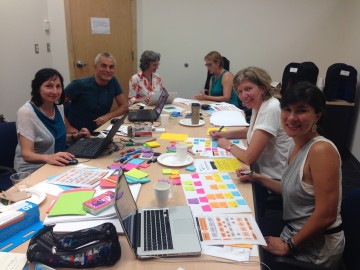
Facilitator: Denise Withers, lumose narrative design.
Module Description:
Genomics researchers and project managers need to be able to design and apply agile and effective evaluation frameworks for their projects to meet the requirements of funders and to mobilize their findings easily. In particular, this includes being able to demonstrate the public benefit and impact of their work (often described in grant applications as “benefits to Canada”).
Logic models, accompanied by explanatory narratives and high level theories of change, are recognized across industry, government and the funding agencies as effective ways to illustrate and communicate the intended outcomes of research projects, as well as the rationale for the work.

Members of our Stakeholder Advisory Committee/Research Partner Project Managers participated in the pilot module and provided very positive feedback.
This two-part pilot course took place on August 11 and 13th, and blended theory and practice to enable researchers and project managers to develop and use logic models as evaluation frameworks for their research. In the first workshop, they worked on developing a theory of change (research rationale) and sketched their own, working logic models, which identified intended outputs, outcomes and impact. In the second workshop, they used a simple narrative structure to blend their theories of change, logic models and desired outcomes into impact stories that are easy to remember and share. Individual coaching will be provided for participants from each research project after the two workshops, to help them refine their evaluation frameworks for current and/or future research projects and grant applications.
Learning Objectives
Upon completion of the course and individual coaching sessions, participants will be able to:
- Develop a logic model that illustrates the intended results (i.e. outcomes) of their research project, key activities the project will undertake, the outputs it intends to produce and the impact it will have.
- Articulate the theory of change upon which each logic model is based.
- Write a concise story that describes the logic model, theory of change and intended impact of the research project.
Read more about the challenges around metrics and evaluation here.
 About Denise Withers, Narrative Strategist, Founder at Lumose Narrative Design
About Denise Withers, Narrative Strategist, Founder at Lumose Narrative Design
Denise Withers is a change consultant who designs stories and strategies that mobilize people and ideas to advance research, innovation and performance. She draws on thirty years experience working across sectors as an award-winning journalist, educator and facilitator to inform decision-making and inspire action. Past national media projects include one of the first documentaries on agbiotech in Saskatoon, multiple TV series on space with NASA, ESA and CSA, a science news series on Environment Canada and a national science feature on Arctic ecosystem research by DFO. She recently spent three years at the Sauder School of Business, designing their evaluation strategy for accreditation and co-founding Canada’s first strategic design studio. In addition to her practical experience, she holds an MSc in Interactive Arts & Technology and a Certificate in Adult and Continuing Education. An engaging speaker and writer, Denise contributes regularly to Stanford Social Innovation Review (online edition), is a Member of the Vancouver Board of Trade and provides narrative leadership for several not-for-profits. Website.
Post-Module Reflections, by Pia Smets, AdapTree
Pia Smets, Project Manager of research project partner AdapTree attended the module and she was able to adapt the skills she gained directly to her project: “In August, I was privileged to attend a storytelling workshop with Denise Withers, as part of the genomics entrepreneurship program. These days, it isn’t enough to have excellent science in a proposal for funding or an evaluation report. Eventually, administrators and politicians also need to be convinced that we deserve to get a slice of their scarce financial resources. Research proposals increasingly need to demonstrate impact. This is some steps removed from direct project outputs, with all the risk and uncertainty involved, so scientists are understandably hesitant to ‘promise the moon’, while at the same time feeling the pressure to do just that.Science is characterized by the unexpected, so rather than a problem, this hurdle allows the characters to shine … if we tell the story well”. Read her reflections after the module here.

